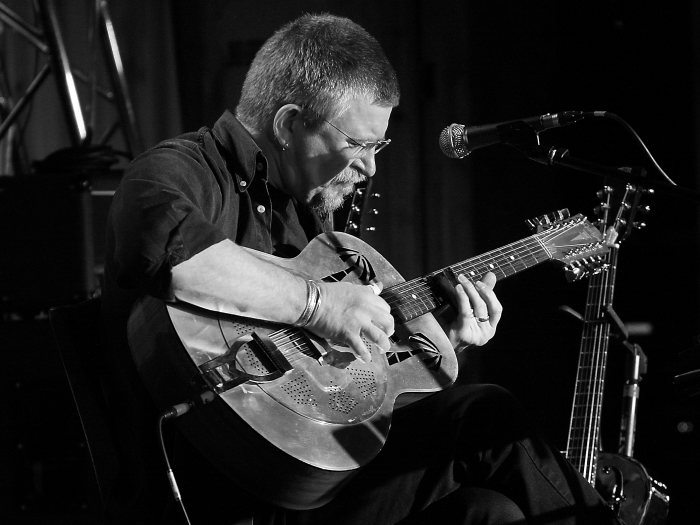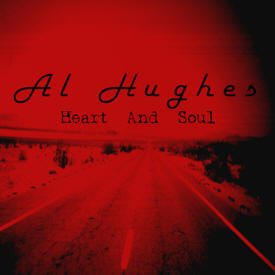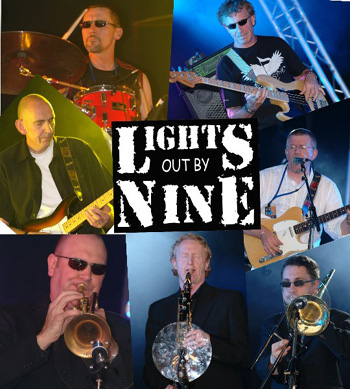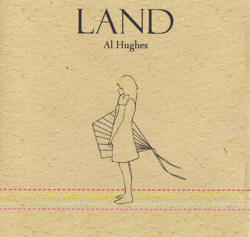|
Lights Out By Nine played the
Skegness
Rock & Blues Festival in January 2009 and I caught up with Al
Hughes after their
set.

What are your first
musical memories?
My first musical memories are probably of people like the Shadows and
Lonnie Donegan appearing on Sunday Night at the London Palladium. I
remember being fascinated by the electric guitars. After that it was the
ďbeat boomĒ and bands like the Beatles and the Rolling Stones, (Still a
favourite).
Did you always was to
become a musician?
I guess I did always want to become a musician,
although I didnít have much idea of how to go about it. Still donít if
the truth be told.
How did you get started in
music and what material were you playing in the early days?
I got started playing in bands at school, with friends, learning all
kinds of cover songs, whatever was in the charts, whatever was easy for
us to play with our limited abilities, sometimes it wasnít whether you
liked the song or not , it was whether we could manage all the chords.
If we couldÖ.great! It was in the set. We were all just learning, not
just how to play, but about equipment, presentation, everything.
Who are your favourite artists?
My favourite artists are a mixed bunch. Iíve
always loved John Martyn, and Captain Beefheart. John Hammond is another
favourite, as is Tom Waits. I also like a Scottish singer /songwriter
called Michael Mara, who I think is seriously underrated. As far as
blues artists are concerned I love Robert Johnson (who doesnít?) Little
Walter, Muddy Waters, Keb Moí, Kelly Joe Phelps, I could go on and on
and on.
Who has influenced you the
most in your music writing and playing?
I think everything you listen to influences you to some extent, but as
far as writing and playing goes, probably Reverend Gary Davis,
Mississippi John Hurt, Skip James, Tom Waits and John Fahey.
What first attracted you
to the blues?
I was first drawn to the Blues in the late sixties during the great
British Blues Boom. Bands like Cream, Savoy Brown and Fleetwood Mac
really struck a chord with me, and listening to them made me want to
hear the original versions of the songs they were playing, so I started
looking for records by people like Howliní Wolf, and Muddy Waters.
Do you see any
similarities between traditional Scottish music and early blues?
I think there are similarities between Blues and traditional Scottish
music. Not so much in the song structures, perhaps, but certainly in the
emotional content of the songs. A lot of poor Scots were forced to leave
the country during the Clearances for example, so there is that element
of loss and sadness that is found in the blues. They also took music
with them, so you come across differing versions or variations of very
similar themes. The song Pretty Peggy for example exists in a variety of
forms in various countries.
What was the best album
you ever had?
The best album Iíve ever had? Itís difficult to narrow it down to just
one, but I have a sampler album called ďthe BluesĒ which came out on
the Marble Arch label around 1967/8. It was a budget label and it was
the first album I bought containing tracks by original blues artists.
There were songs by Washboard Sam, Muddy Waters, Elmore James, Willie
Dixon and many others. It was a revelation. I still have the album, and
I still play it, although itís getting a bit worn now.
What is your favourite
instrument?
My favourite instrument is guitar of which I have
many.
Al, I understand you have
a custom built 12 string resonator guitar, tell me more.
My 12 string was built for me by Bill Little at
Gadgie Guitars in the Lake District. It has wooden sides and back, and a
metal front with palm tree sound holes. The resonator cone has a metal
biscuit machined from aluminium rather than a wooden one, and the whole
thing works extremely well. It sounds huge! Bill makes great guitars. I
hope to own one of his all metal 6string resonators some time soon. I
would recommend them to anyone who is serious about playing slide.
 Are there any
particular songs that you play that have special meaning to you? Are there any
particular songs that you play that have special meaning to you?
Gravity Shoes off the first album (Al Hughes) is a song Iím very fond
of. I also like the instrumental piece, Requiem For John Fahey which I
wrote for the third album (Heart and Soul) after hearing of his death.
As well as playing and writing some wonderful pieces, John Fahey did a
great deal to track down Blues players who were living in obscurity,
and often extreme poverty , and bring them back into the public eye.
His contribution to Blues music is often overlooked I feel. He never
really got the recognition he deserved in my opinion.
How healthy do you think
the blues scene is in Scotland compared with the UK?
The blues scene in Scotland is patchy I think.
There are some places where it is thriving, notably the bigger cities
like Dundee and Glasgow, although the emphasis tends to be on bands
playing blues /rock covers. Having said that however Scotland has
produced some great artists such as Tam White, Maggie Bell and Fraser
Spiers. Some of the newer acts like Dave Arcari are building a good
following as well. The Dundee Blues Bonanza is growing every year,
although the current economic situation is making things difficult.
Traditional music always seems to do better in terms of support and
sponsorship than blues for some reason.
Tell me about the band,
when did you all get together?
Lights Out Have been together in various forms
for many years. Dougie, Alan and myself played together in the early
eighties, and we used to talk about playing with horns and doing old
soul material. This was P.C. (pre Commitments). We finally put something
together after about a year of rehearsals and played a couple of charity
gigs. The reception was so good that we decided to keep going and see
what happened. After a few years we began playing a few of our own
songs, and again the reaction was very positive so we continued in that
vein and here we are 4 albums later.
The band's live shows now
includes a more laid back acoustic set, tell me more.
The acoustic set grew out of a desire to broaden things out a little. We
found ourselves playing more and more seated concert type gigs in
theatres and arts centres, where things were much quieter and audiences
more attentive, so it became possible to do stuff that wouldnít be
possible in a more lively situation. Itís been received very well by
both audiences and our record label, so the chances are the next album
will have some acoustic stuff on it as well.
 Tell
me about the making of your new DVD. Tell
me about the making of your new DVD.
The DVD has been in the pipeline for quite a while. We were doing a show
at the Carnegie Hall in Dunfermline along with two other bands, The
whole show was filmed and the sound recorded separately then synched up
to the visuals and the whole thing was edited by people a whole lot
smarter than me . It all came together quite well I think. We added some
footage we had from a different show at the same venue, thatís the
backstage stuff with Tam White and Fraser Spiers. And we also did a
short interview with Graeme Scott who compered the show and who also
writes for Blues Matters magazine.
Al, tell me about the
making of your latest CD.
The new album is a bit of a departure for me. The
previous three CDs have all been made up entirely of original material
but this time I did some of my favourite songs by other artists, as well
as a couple of traditional songs. The whole thing was recorded very
quickly and with a minimum of overdubs and studio trickery, (itís real
easy to get carried away in a studio and start adding all kinds of stuff
until you end up with something you canít play live). There are three
original songs on there as well so itís a bit more disparate than
previous efforts. I thought initially that it might be too eclectic, but
reactions so far have been really good.
Some music styles are fads
but the blues is always with us. Why do you think that is?
I think the blues is always around because it connects with people.
There are so many different styles that draw you in. You always want to
learn more about it. And the emotions expressed are generally the same
for everybody whatever your background or origins. Itís always
progressing too, there are always new artists emerging who are able to
take the music further or in a different direction. Thereís an honesty
about it too that you donít always find in other genres. And the
simplicity of its structures make it easy for people to play and write
and communicate.
How do you see the future
of blues music?
I think Blues is enjoying a high profile just now . I hope that will
continue. Exciting new artists like Joe Bonamassa and Matt Schofield are
bringing the music to a younger and wider audience, and that I think is
vital if blues is to stay vibrant and exciting. It has to appeal to
younger audiences otherwise it will stagnate. Fortunately the stylistic
breadth and variety mean that appeal is widening. Thereís something
there for everybody if you take the time to look, and if you do youíll
find itís well worth it.
What are your future plans / gigs / tours /
albums?
As far as future plans go, Lights Out have been asked to record with a
ďnameĒ producer at some point this year, so weíre writing and recording
demos etc. We probably wonít be doing as many live gigs as we would
normally, although there are a few lined up already. Solo wise Iíll be
touring in England in June and October as well as heading north to
Shetland in July and the north of Scotland in November. Iím also putting
a DVD together which should appear later in the year. Itís been a busy
start to the year and looks like continuing in the same vein.
Thank you
so much Al, I really appreciate your time.
 Check out Al's
new album - excellent! Check out Al's
new album - excellent!
www.al-hughes.com
www.lightsoutbynine.co.uk
Return to
Blues Interviews List
Website, Photos & Text © Copyright 2000-2009 Alan
White. All Rights Reserved.
For further information please email:
alan.white@earlyblues.com
|










 Are there any
particular songs that you play that have special meaning to you?
Are there any
particular songs that you play that have special meaning to you? Tell
me about the making of your new DVD.
Tell
me about the making of your new DVD. Check out Al's
new album - excellent!
Check out Al's
new album - excellent!